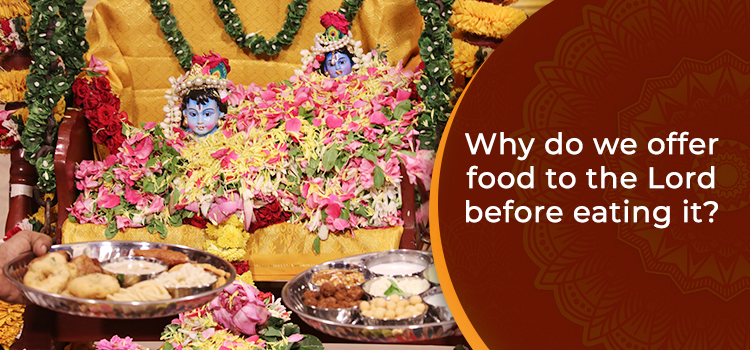Why Do We Offer Food to the Lord before Eating It?
Offering food to God is a common Hindu practice. The food offered to God is later eaten as Prasad or a gift from God. Hindus also offer food to God during Poojas or ritualistic worship. For a devout Hindu, offering food to gods is a rite of purification as well as redemption. For, the act purifies the food and frees the one who offers it from sin.
Some may see it as just a ritual, while others may see it as superstition. But in reality, it is an act performed to free us from the sin of selfishness. The Bhagavadgita (3.13) says, "The pious who eat what is left of a sacrifice get freedom from all sins, but those evil (persons) verily eat sin, who cook food for themselves." It also says (17.13) that if food is not distributed during a sacrifice, it (the sacrifice) becomes tamasic in nature. This is the justification for Hindus offering food to God. Many people do this without knowing why because others do it or it is a family tradition. But one must make the offering sincerely, or it has no meaning.
 The best way is to do it silently, with gratitude and reverence. The food that we eat ultimately goes to the gods who dwell within our body. They share it as per their contribution to the body’s well-being of the body and their importance in its preservation.
The human body is similar to a small universe. One can call it the Mount Meru of the microcosm, and 7 concentric circles of oceanic consciousness surround it. The gods dwell in it just as they dwell in the macrocosm. They are your organs, breaths, and tattvas. They have their respective duties to maintain the Dharma of the body, which is serving the Self that dwells within it as its devotee. This Dharma serves you; also, all the gods who live within you also serve you.
The best way is to do it silently, with gratitude and reverence. The food that we eat ultimately goes to the gods who dwell within our body. They share it as per their contribution to the body’s well-being of the body and their importance in its preservation.
The human body is similar to a small universe. One can call it the Mount Meru of the microcosm, and 7 concentric circles of oceanic consciousness surround it. The gods dwell in it just as they dwell in the macrocosm. They are your organs, breaths, and tattvas. They have their respective duties to maintain the Dharma of the body, which is serving the Self that dwells within it as its devotee. This Dharma serves you; also, all the gods who live within you also serve you.
 The best way is to do it silently, with gratitude and reverence. The food that we eat ultimately goes to the gods who dwell within our body. They share it as per their contribution to the body’s well-being of the body and their importance in its preservation.
The human body is similar to a small universe. One can call it the Mount Meru of the microcosm, and 7 concentric circles of oceanic consciousness surround it. The gods dwell in it just as they dwell in the macrocosm. They are your organs, breaths, and tattvas. They have their respective duties to maintain the Dharma of the body, which is serving the Self that dwells within it as its devotee. This Dharma serves you; also, all the gods who live within you also serve you.
The best way is to do it silently, with gratitude and reverence. The food that we eat ultimately goes to the gods who dwell within our body. They share it as per their contribution to the body’s well-being of the body and their importance in its preservation.
The human body is similar to a small universe. One can call it the Mount Meru of the microcosm, and 7 concentric circles of oceanic consciousness surround it. The gods dwell in it just as they dwell in the macrocosm. They are your organs, breaths, and tattvas. They have their respective duties to maintain the Dharma of the body, which is serving the Self that dwells within it as its devotee. This Dharma serves you; also, all the gods who live within you also serve you.






